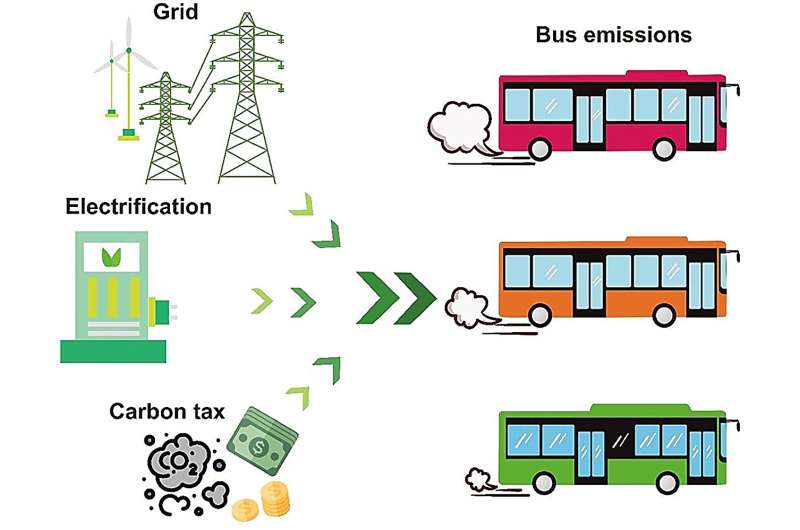This article has been reviewed according to Science X's editorial process and policies. Editors have highlighted the following attributes while ensuring the content's credibility:
fact-checked
trusted source
proofread
E-buses will drive urban net-zero target success, according to new research

Political and policy leaders worldwide are embarking on urgent decarbonization projects to meet their Paris Climate Accords targets. These efforts take multiple approaches, including the electrification of municipal bus fleets.
A paper on this topic led by Concordia researchers was recently published in the journal Transportation Research Part D: Transport and Environment. In it, they describe a new framework to analyze the effectiveness and emission-reduction potential of electrifying transit policies. It includes estimates of upgrading infrastructure costs, operating costs, maintenance costs, carbon pricing and societal costs associated with air pollution in four Canadian cities.
The researchers find that the electrification of bus fleets can lead to significant reductions not only in total greenhouse-gas emissions but also in maintenance and societal health-related costs.
An estimated 22 percent of Canada's greenhouse-gas emissions comes from the transportation sector. Decreasing its overall reliance on polluting fossil fuels is therefore critical to achieving the Paris Accords targets.
"When combined with other efforts to decarbonize energy systems, our research shows that from 2019 to 2030, cumulative GHG emissions of bus fleets in Toronto, Montreal, Edmonton and Halifax were reduced by 18.7 percent, 30.1 percent, 21.3 percent and 34.6 percent respectively," says the study's primary author Xuelin Tian. Tian is a Ph.D. student in the Department of Building, Civil and Environmental Engineering at the Gina Cody School of Engineering and Computer Science.
Owen Waygood from Montreal's École Polytechnique contributed to this paper, along with Concordia Ph.D. students Zhikun Chen and He Peng. Associate professor Chunjiang An is the corresponding author.
Greener and cheaper
To build their framework, the researchers gathered data on a wide range of variables. These include detailed vehicle analysis, looking at the bus fleet stock, the years of service, their fuel economy and their propulsion systems.
They then conducted transition analysis and resource analysis. These examined bus lifespan standards, survival probability and estimates on future demand. These were further combined with analysis of the transit agencies' e-bus penetration targets, charging methods and loss, and daily mileage.
The researchers also conducted a cost-benefit analysis using the Long-range Energy Alternatives Planning system (LEAP) model. Factors such as the overall cost of electricity generation, especially for power systems, vehicle costs, carbon pricing, operating and maintenance costs projections and economic costs related to air pollution and infrastructure were all included in their calculations.
The overall cost to transit agencies of moving from traditional diesel-powered buses to EV buses is considerable. The researchers say costs can be mitigated using a gradual approach that includes the temporary introduction of hybrid buses, similar to the ones adopted by Toronto and Montreal. This, they say, can lower costs in the short term while still reducing overall emissions.
Further, the design parameters of transportation operations after the transition, such as daily mileage, also need to be retaken in account, which can help reduce the operation costs.
One part of a bigger plan
The researchers specifically chose to look at Toronto, Montreal, Edmonton and Halifax because all four cities have clear public transit transition plans in place. Tian says the agencies are proving to be serious about their commitments but remain close to their starting line. It will take well over a decade for fleets to become 100 percent electric.
"EV buses are a huge investment, so obviously money is a challenge to transitioning to all-electric fleets," Tian says. "So is the upstream electricity generation—how clean it is will be another key factor in terms of maximizing environmental benefits. While the majority of power in Quebec and Ontario comes from renewable sources, Alberta and Nova Scotia need to increase the share of renewable energy for their entire power systems."
She adds that without an overall power system transition to primarily renewable resources, electrifying bus fleets will have only a minor effect on GHG emissions. Cooperation among municipal transit agencies, the bus manufacturers and the power companies is essential.
Tian says the framework she and her co-authors developed can be transferred to other cities, provided that they too have an electrification plan in place.
"As long as they have determined to make the transition and they can combine their current fleet and their future targets into our framework, they will be able to quantify the cost-benefit analysis in terms of future scenarios," she says.
More information: Xuelin Tian et al, Achieving urban net-zero targets through regionalized electric bus penetration and energy transition, Transportation Research Part D: Transport and Environment (2023). DOI: 10.1016/j.trd.2023.103797
















